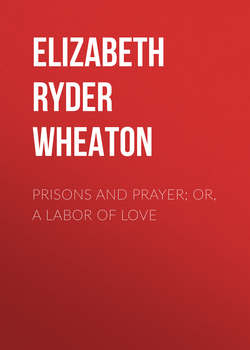Читать книгу Prisons and Prayer; Or, a Labor of Love - Elizabeth Ryder Wheaton - Страница 4
Introduction
ОглавлениеThis world is, to a large extent, a great prison house. Nearly all of its inhabitants are prisoners surrounded by walls of sin and darkness. Many are bound down by the curse of rum, others by the besetting sins of lust, unholy temper, envy, revenge, malice, hatred, jealousy, prejudice, pride, covetousness, or selfishness resulting from a carnal mind. Out of the vast multitudes that are led captive by the devil at his will, a few that have violated human law have been sentenced to various prisons and reformatories. This book has much to say about the men and women behind prison walls. It records the sad story of many prisoners in a way that very few can read without being moved to tears and that will awaken sympathy in the hardest hearts. It also tells of the work of God among prisoners both in this and other countries. It records some of the brightest of Christian experiences on record, showing how many prisoners that have been slaves to worse than human law and have lived in greater darkness than in the prison dungeon, have been made free by being translated into the light that outshines the noonday sun, and how they have been enabled to live noble, Christian lives behind the bars.
We are well acquainted with the author, having known her for several years and having had the privilege of entertaining her in our home more or less during that time. This acquaintance has enabled us to know something of the burden that rests upon her soul for prisoners. She has doubtless spent more time in the work, visited more prisons and traveled farther than any other living prison worker. She has visited practically all of the prisons of the United States and Canada and most of them many times, and twice she has crossed the sea. Her mission has been a mission of loving service, with but little financial reward. But the Master who laid this work upon her heart has given her rich reward for all her toil and privation and suffering, for many have been converted through her instrumentality. Some have gone to their reward. Many others, both in and out of prison, are living honest, useful lives.
Had this work been written only for the hasty reader who has but a few hours at the most to give, much that it contains might better have been omitted; but such as these can easily select from its pages that which is most to their liking, while those who are deeply interested in the work of soul-saving, as well as the prisoner whose spare hours drag heavily and slowly, will here find food for study and encouragement that will repay for many days of careful reading.
In many respects, such a work as is here represented has never been done by any other person. For these hundreds of pages give but a few glimpses, as it were, of the work "Mother Wheaton" has done. We have assisted her in gleaning from the many hundreds of letters still in her possession (though much of her correspondence was destroyed by fire) and in arranging and preparing matter for publication. We have listened as with eyes filled with tears she has told us of the needs of the work, and with every day thus spent we have become more deeply interested in the work to which her life has been given. In a memorial service it was said of the late Bishop William Taylor: "He was not an organizer nor an administrator; not a statesman, in the ordinary use of those terms. He was rather a great religious pioneer. He blazed pathways through unknown moral wilds, and left the work of organization mainly to those who might follow after." Such, in her field of labor, has largely been the work of Mother Wheaton.
No place has been far enough away, no stockade hard enough to reach, no day warm enough or cold enough or stormy enough, no prison official or stockade captain sufficiently abusive, to discourage her when she felt that the Master bade her go forward.
With a burning love for all the sinful and all the needy, she has gone from north to south and from east to west, seeking the lost as one seeks for hidden treasure. Through nights of weariness and days of toil she has sought them and loved them and wept over them, man or woman or child, as a mother weeps over and loves her own. She has borne their burdens and shared their sorrows—ever bringing to them the cheering word, the testimony or inspiring song, the faithful warning, the earnest prayer, the plain gospel message, the hearty hand-clasp, the loving "God bless you."
We believe and pray that these pages may be greatly used of God to reach thousands of hearts and stir up many to carry forward the work so dear to her, when "Mother Wheaton" has crossed over to meet those that are waiting to welcome her on the other side.
Yours, in Jesus' love,
Etta E. Shaw.
S. B. Shaw.
Chicago, Ill., 1906.
